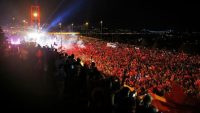
Trump, Erdogan and the New Global Order
The current crisis between Ankara and Washington over the fate of the imprisoned American pastor Andrew Brunson is the culmination of a long-simmering dispute over the fundamental nature of the relationship between the United States and Turkey. Both sides want the relationship to continue but have irreconcilable expectations about whose terms it should continue on.
Washington, after years of frustration, is seeking to enforce some ground rules for the alliance by showing President Recep Tayyip Erdogan that he will pay a price for arresting innocent Americans, buying Russian weapons and ignoring the United States’ sanctions against Iran.
Ankara is seeking to challenge the “asymmetric” balance of power within the alliance, insisting that Washington can no longer dictate Turkey’s economic relations with its neighbors, ignore its strategic concerns over Kurdish fighters in Syria or expose the Turkish government’s corruption and human rights abuses.… Seguir leyendo »


